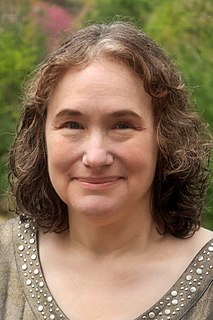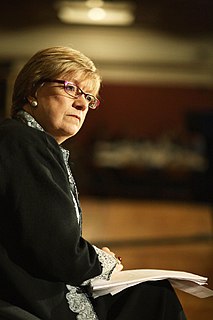A Quote by Richelle Mead
She felt so much emotionally, she would say, that a physical outlet - physical pain - was the only way to make her internal pain go away. It was the only way she could control it.
Related Quotes
I didn’t get her cutting at all. She’d done it sporadically, ever since the accident and it scared me each time. She'd try to explain it to me, how she didn't want to die—she just needed to get it out somehow. She felt so much emotionally, she would say, that a physical outlet—physical pain—was the only way to make the internal pain go away. It was the only way she could control it.
She expected the pain, when it came. But she gasped at its sharpness; it was not like any pain she had felt before. He kissed her and slowed and would have stopped. But she laughed, and said that this one time she would consent to hurt, and bleed, at his touch. He smiled into her neck and kissed her again and she moved with him through the pain. The pain became a warmth that grew. Grew, and stopped her breath. And took her breath and her pain and her mind away from her body, so that there was nothing but her body and his body and the light and fire they made together.
She stared at herself in the mirror. Her eyes were dark, almost black, filled with pain. She'd let someone do that to her. She'd known all along she felt things too deeply. She became attached. She didn't want a lover who could walk away from her, because she could never do that - love someone completely and survive intact if her left her.
Sometimes she wished for someone she could tell about her problems, just to be able to say, ‘I’m in love with a man and I can’t have him.’ But that would only lead to questions she couldn’t answer, so she kept the secret and the pain inside, hoping someday she would no longer feel as if half of her were missing.
What's the difference between bulimics and anorexics?" I ask. "Anorexics are anorexics all the time," she says, "I'm only bulimic when I'm throwing up." Wow. She sounds just like my dad! "I'm only an alcoholic when I get drunk." There are all kinds of addicts, I guess. We all have pain. And we all look for ways to make the pain go away. Penelope gorges on her pain and then throws it up and flushes it away. My dad drinks his pain away. (107)
This was something she would keep hidden within herself, maybe in place of the knot of pain and anger she had been carrying under her breastbone...a security blanket, an ace up her sleeve. She might never use it, but she would always feel its presence like a swelling secret stone, and that way when she let go of the rage, she would not feel nearly as empty.
...she merely wished to find a way out of the maze. She knew that she had become a burden to him: she took things too seriously, turning everything into a tragedy, and failed to grasp the lightness and amusing insignificance of physical love. How she wished she could learn lightness! She yearned for someone to help her out of her anachronistic shell.
As a woman, she [Penelope Cruz] obviously has changed as she has become an adult. But, as an actress, I actually might say that she has not changed that much. And she has something great, especially in comedy, and she hasn't been exploited as much as she could be in comedy, but particularly in that mix between comedy and drama. She's got a very special quality about her. You can place her in very extreme situations, especially very painful situations, in terms of how her character interprets it. And sometimes, the deeper and more human that pain is, the better she is at it.
Later on Lady Maccon was to describe that particular day as the worst of her life. She had neither the soul nor the romanticism to consider childbirth magical or emotionally transporting. So far as she could gather it mostly involved pain indignity and mess. There was nothing engaging or appealing about the process. And as she told her husband firmly she intended never to go through it again.
The song "This Is Not Surreal," was inspired by a painter I love, Frida Kahlo. She really did suffer for her art. She speaks to me. She was brutally honest in her work. At that time in fine art, you really didn't see many female artists expressing that. She was such a strong female presence, and I really look up to her. She had a lot of physical pain.

































